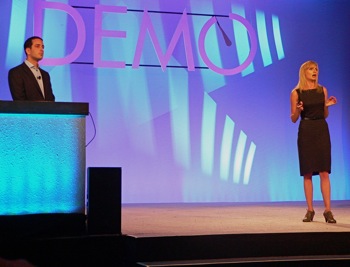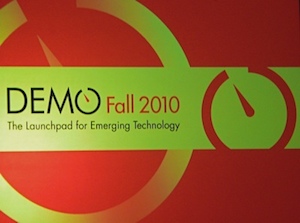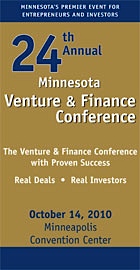 Can one learn anything listening to a lot of startup pitches? I mean even if your job, like that of a VC, doesn't require it, per se. Yes, I believe you can, and I've invested a large part of my time and attention over the years to this practice, betting that doing so brings value to my clients.
Can one learn anything listening to a lot of startup pitches? I mean even if your job, like that of a VC, doesn't require it, per se. Yes, I believe you can, and I've invested a large part of my time and attention over the years to this practice, betting that doing so brings value to my clients.
I began attending and reporting on many of the large, national tech conferences (most in California, but some in other U.S. cities and resort locations) more than 12 years ago – as a way to juice my own knowledge as a tech marketing consultant and startup advisor, and to keep out in front of tech trends. (Not to speak of being able to meet and network with lots of heavyweights.) This pastime of sorts is what basically turned me into a blogger, and even an accidental part-time journalist — actually getting paid occasionally to write about what I learned at these events. Imagine that. (That was before the intrinsic value of a blog post starting going to zero. But I digress…) After proving myself early-on as a good event reporter, the conferences began granting me press passes.
I've heard so many startup pitches over my career, especially during the last 12 years, that I've lost count. But I have no doubt it's more than 1000. And I've been lucky enough to document most of them — certainly hundreds — in my writings. Twitter and live-blogging tools in recent years have only added to my output. Someday, maybe I'll even turn my blog archives into a large coffee-table book. (Yeah, right, like I'd ever have the time! And a large percentage of these startups are now either out of business or acquired, so who would care?) Just one live-blog I did of a two-day conference last month totaled 9000 words. More on that below.
The many conferences I've attended include top events like DEMO (11 times), Esther Dyson’s PC Forum 2006 (the swan song), Under The Radar, TechCrunch 50, several O'Reilly events, those sponsored by leading publications (e.g., Forbes, Fortune, WSJ), Defrag and Glue, and many smaller, newer, or regional startup events such as CrowdPitch as well. The collective intelligence I gather from this investment of time (and money) has been remarkably valuable to me personally, and to my clients.
How? Well, in several areas: understanding and assessing trends, messaging, strategy, business models, and what I'll call style, or stage presence. By observing the best-of-the-best pitch their businesses (all these conferences closely vet applicants), I'm better able to understand not only where technology startup trends are going, but I can hear the best stories, the best messaging. I get to see with my own eyes what resonates, what hits the mark — meaning the startups that best get people to pay attention, take action, elicit media interest, attract customers, and (not the least) cause investors to write checks. Sure, not all these technology startups will make it. But, because I'm getting extensive exposure to this cream-of-the-crop with the best potential, I've found that I'm in a much better position to help guide my clients back home in their own business planning, marketing and launch strategy, media strategy and tactics, and even in coaching the founders in their own on-stage startup pitches. I can also teach them to avoid the mistakes I see others make.
 Just a few weeks ago, I attended my 11th DEMO conference, and my 10th in a row. (The event is held twice a year, and the recent one, called "DEMOfall 2010," was held in Santa Clara, CA.) Long ago dubbing itself "The Launchpad for Emerging Technology," DEMO is generally regarded as the inventor of the startup pitch fest, and certainly has the longest, continuous track record. Launched in 1991 by Stewart Alsop (whom I've had the privilege to meet at more than one DEMO), this venerable event was acquired by IDG many years ago, and is still the gold standard. It is extremely well run, and remains my favorite conference of them all. It never disappoints. The main thing to remember about DEMO is that it attracts a large, prestigious press and blogger contingent, and generates more than 200 million media impressions for the collective participants of each conference. Not to minimize the importance of the many investors that regularly attend, too –- it attracts those, and the presenting startups, from around the globe. Over the years, startups pitching at DEMO events have collectively raised hundreds of millions of dollars — billions, I'm sure — in funding. And many of them, household names now, have been acquired or gone public. Check this list of DEMO alumni companies, and it only includes those for the years 2006-2010.
Just a few weeks ago, I attended my 11th DEMO conference, and my 10th in a row. (The event is held twice a year, and the recent one, called "DEMOfall 2010," was held in Santa Clara, CA.) Long ago dubbing itself "The Launchpad for Emerging Technology," DEMO is generally regarded as the inventor of the startup pitch fest, and certainly has the longest, continuous track record. Launched in 1991 by Stewart Alsop (whom I've had the privilege to meet at more than one DEMO), this venerable event was acquired by IDG many years ago, and is still the gold standard. It is extremely well run, and remains my favorite conference of them all. It never disappoints. The main thing to remember about DEMO is that it attracts a large, prestigious press and blogger contingent, and generates more than 200 million media impressions for the collective participants of each conference. Not to minimize the importance of the many investors that regularly attend, too –- it attracts those, and the presenting startups, from around the globe. Over the years, startups pitching at DEMO events have collectively raised hundreds of millions of dollars — billions, I'm sure — in funding. And many of them, household names now, have been acquired or gone public. Check this list of DEMO alumni companies, and it only includes those for the years 2006-2010.
Last month, I live-blogged the entire two-day-plus DEMOfall 2010 program, an agenda made up mostly of rapid-fire, back-to-back startups pitches, some 70 companies in all, with several great panels and interviews mixed in. (In that live-blog archive, scroll down to get to the meat of the pitches, since, on the afternoon of registration, I allowed all those on Twitter posting tweets with the event hashtag to flow into my live-blog, as people were traveling to and arriving at the event, including me. Part of the fun is the anticipation!)
In addition, I did nine audio interviews of some of my favorite startups while I was at DEMOfall 2010: here's the link to all my blog posts for this event, which include links to those interviews. I started doing audio interviews of startup founders several DEMO conferences back. Two of the companies I interviewed even went on to be named among the DEMOgod Award winners. My photos of the event are here on this Flickr set.





Recent Comments